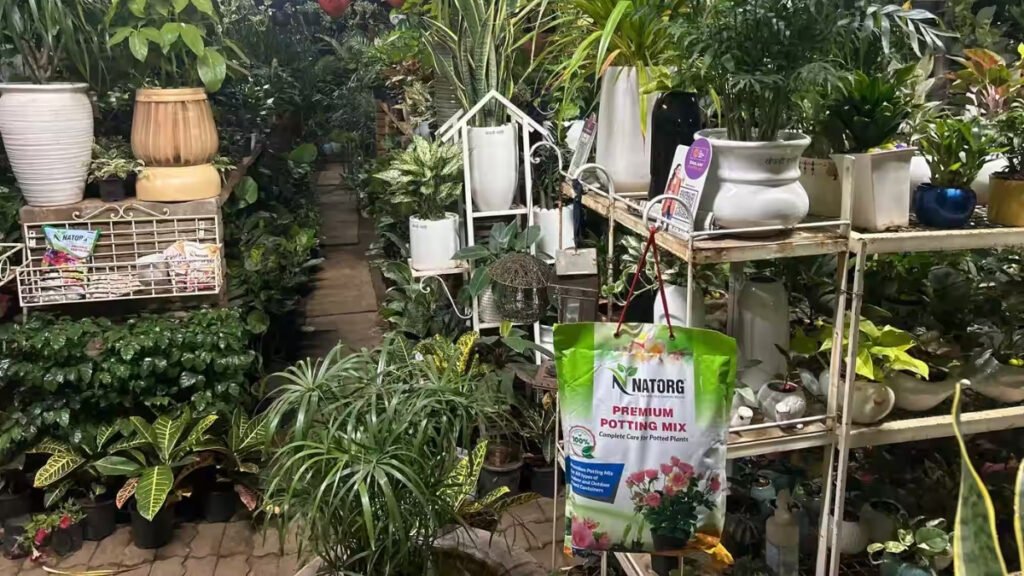Starting a nursery business can be an incredibly rewarding venture, whether you’re operating from your own backyard or scaling it into a full-fledged business. The demand for plants is ever-growing, driven by landscaping projects, home gardeners, and even larger agricultural needs. By choosing the right nursery model, you can optimize your investment, make a significant profit, and create a sustainable income stream. In this blog post, we’ll explore six effective nursery models that can help you grow your income and build a profitable business.
1. Home-Based Plant Nursery
Starting a plant nursery from your own backyard is one of the most cost-effective ways to enter the business. This model involves growing plants in your garden or outdoor space and selling them directly to customers, either from your home or through local markets. The key advantage of this model is low overhead costs, as you’re using your own land and resources to cultivate plants.

You can specialize in various types of plants depending on your location, space, and interests. Popular choices include ornamental plants, herbs, vegetables, and houseplants. A home-based nursery allows for flexibility in terms of scale. You can start small and gradually increase your operation as demand grows.
This model also enables you to tap into the local market by advertising through word of mouth or through social media platforms like Instagram or Facebook. Customers looking for locally grown plants often prefer purchasing from small, home-based nurseries due to the personal touch and quality assurance.
2. Greenhouse Nursery
A greenhouse nursery is an excellent way to control environmental conditions and extend your growing season, making it ideal for growing plants that require specific climate conditions. Whether you’re working with flowers, vegetables, or specialty crops, a greenhouse allows for year-round production, even in regions with harsh winters or unpredictable weather.
Greenhouse nurseries can be operated on a small scale or expanded into a large business depending on your space and capital investment. One of the main benefits of a greenhouse model is the ability to produce higher-quality plants by maintaining optimal temperature, humidity, and light levels. Additionally, greenhouses are energy-efficient, as they use solar power to heat the environment and can be set up with automated systems to control irrigation and humidity.

With the right greenhouse setup, you can grow a variety of plants, from tropical species to vegetables, offering them to a broader market. Selling plants directly to consumers, as well as to landscapers, gardening stores, or restaurants, can help you expand your customer base. As greenhouse systems continue to evolve, the potential for higher yields and specialized crops grows, creating ample opportunities for growth and profit.
3. Wholesale Nursery
If you’re looking to scale your plant-growing business quickly and reach a larger audience, a wholesale nursery model is the way to go. A wholesale nursery produces large quantities of plants and sells them in bulk to other businesses, including landscapers, garden centers, and even large retail chains.

The primary advantage of this model is that it allows you to sell at a larger scale and gain steady, bulk orders. However, it requires a substantial investment in infrastructure, equipment, and labor to grow and manage the plants in large quantities. As with all wholesale businesses, pricing is competitive, so your margins may be smaller than in retail, but the volume of sales can make up for it.
To succeed in wholesale, you’ll need to focus on growing popular and in-demand plant varieties. You might consider specializing in certain plant categories, like trees, shrubs, or flowering plants, to build a reputation within that niche. It’s important to create relationships with reliable distributors and retailers, as they will be key to your business’s success in the wholesale market.
4. Organic Plant Nursery
Organic gardening has become increasingly popular, and consumers are increasingly looking for plants that are free from synthetic pesticides, fertilizers, and chemicals. Starting an organic plant nursery not only taps into this growing trend but also aligns with sustainable farming practices, which are becoming more important to modern-day consumers.

The organic nursery model can include a variety of plants, such as vegetables, herbs, flowers, and shrubs. You can also grow seedlings for gardeners who prefer growing their own food without relying on store-bought plants treated with chemicals. In addition, you can offer products like organic compost, natural pest controls, and organic fertilizers, diversifying your product offerings.
Building a loyal customer base in the organic market requires dedication to sustainable practices, transparency about your growing methods, and a strong marketing strategy that highlights the benefits of organic plants. Establishing your nursery as a trusted source for organic plants and supplies can generate a premium for your products, allowing for higher profit margins.
5. Landscaping and Garden Design Nursery
If you’re passionate about both plants and design, a landscaping and garden design nursery might be a perfect fit. This model combines plant sales with landscaping services, offering customers both the plants they need and the expertise to design and install their gardens. This model can be especially lucrative if you have a background in horticulture or landscape design.

With this model, your nursery would supply plants for your customers’ landscaping projects, and you could offer services like garden design, installation, and maintenance. For example, customers may hire you to redesign their gardens or install specific plants that require expert placement and care. You could also offer seasonal landscaping services, such as planting spring flowers or designing fall landscapes.
The landscaping and garden design model creates the opportunity for long-term client relationships. It’s a service-based business that often results in repeat customers, as clients will need ongoing garden care, seasonal plantings, or updates to their landscapes. Additionally, having a nursery as part of your offering allows you to generate consistent income from plant sales while providing specialized services.
6. Specialty or Exotic Plant Nursery
If you’re looking to create a niche business, specializing in rare, unusual, or exotic plants can set you apart from the competition. Whether you focus on rare indoor plants, tropical species, or native plants from other regions, offering specialty plants appeals to customers with specific tastes or gardening needs. Many plant enthusiasts are willing to pay a premium for hard-to-find species, and this can create opportunities for higher profit margins.
A specialty plant nursery requires in-depth knowledge of the plants you’re growing, including their care requirements, environmental needs, and ideal growing conditions. The plants could include anything from exotic houseplants, bonsais, or cacti to more unusual species like orchids or carnivorous plants. Marketing for a specialty plant nursery often focuses on educating customers about the plants’ unique qualities, which can foster a strong community of plant lovers.
Operating a specialty nursery can be more labor-intensive, as these plants often require more specific care. However, the growing demand for unique plants can result in a loyal customer base and high-margin sales, making this model potentially very profitable for those with expertise in unusual plant varieties.
Conclusion
There’s no one-size-fits-all model for growing a profitable nursery business, but each of the six models presented here offers unique opportunities depending on your location, interests, and expertise. Whether you’re looking to operate from your own backyard, start a larger-scale wholesale business, or offer specialized services like landscaping or organic plants, there are numerous ways to turn your passion for plants into a sustainable source of income.
The key to success in any nursery model is understanding your target market, offering high-quality products, and creating a strong brand presence. With the right approach, you can cultivate not just plants, but a thriving business that continues to grow year after year.

